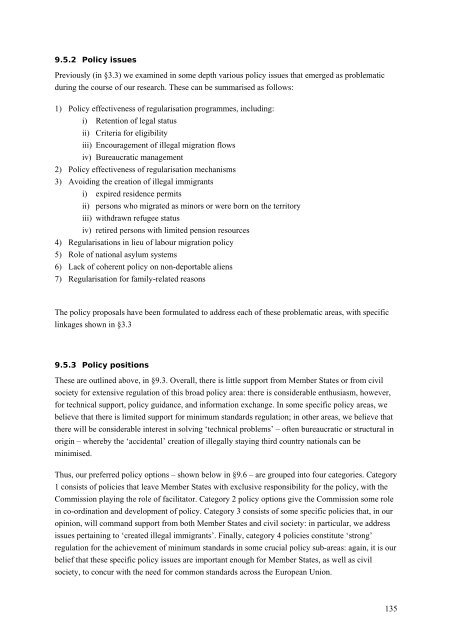REGINE Regularisations in Europe Final Report - European ...
REGINE Regularisations in Europe Final Report - European ...
REGINE Regularisations in Europe Final Report - European ...
You also want an ePaper? Increase the reach of your titles
YUMPU automatically turns print PDFs into web optimized ePapers that Google loves.
9.5.2 Policy issues<br />
Previously (<strong>in</strong> §3.3) we exam<strong>in</strong>ed <strong>in</strong> some depth various policy issues that emerged as problematic<br />
dur<strong>in</strong>g the course of our research. These can be summarised as follows:<br />
1) Policy effectiveness of regularisation programmes, <strong>in</strong>clud<strong>in</strong>g:<br />
i) Retention of legal status<br />
ii) Criteria for eligibility<br />
iii) Encouragement of illegal migration flows<br />
iv) Bureaucratic management<br />
2) Policy effectiveness of regularisation mechanisms<br />
3) Avoid<strong>in</strong>g the creation of illegal immigrants<br />
i) expired residence permits<br />
ii) persons who migrated as m<strong>in</strong>ors or were born on the territory<br />
iii) withdrawn refugee status<br />
iv) retired persons with limited pension resources<br />
4) <strong>Regularisations</strong> <strong>in</strong> lieu of labour migration policy<br />
5) Role of national asylum systems<br />
6) Lack of coherent policy on non-deportable aliens<br />
7) Regularisation for family-related reasons<br />
The policy proposals have been formulated to address each of these problematic areas, with specific<br />
l<strong>in</strong>kages shown <strong>in</strong> §3.3<br />
9.5.3 Policy positions<br />
These are outl<strong>in</strong>ed above, <strong>in</strong> §9.3. Overall, there is little support from Member States or from civil<br />
society for extensive regulation of this broad policy area: there is considerable enthusiasm, however,<br />
for technical support, policy guidance, and <strong>in</strong>formation exchange. In some specific policy areas, we<br />
believe that there is limited support for m<strong>in</strong>imum standards regulation; <strong>in</strong> other areas, we believe that<br />
there will be considerable <strong>in</strong>terest <strong>in</strong> solv<strong>in</strong>g ‘technical problems’ – often bureaucratic or structural <strong>in</strong><br />
orig<strong>in</strong> – whereby the ‘accidental’ creation of illegally stay<strong>in</strong>g third country nationals can be<br />
m<strong>in</strong>imised.<br />
Thus, our preferred policy options – shown below <strong>in</strong> §9.6 – are grouped <strong>in</strong>to four categories. Category<br />
1 consists of policies that leave Member States with exclusive responsibility for the policy, with the<br />
Commission play<strong>in</strong>g the role of facilitator. Category 2 policy options give the Commission some role<br />
<strong>in</strong> co-ord<strong>in</strong>ation and development of policy. Category 3 consists of some specific policies that, <strong>in</strong> our<br />
op<strong>in</strong>ion, will command support from both Member States and civil society: <strong>in</strong> particular, we address<br />
issues perta<strong>in</strong><strong>in</strong>g to ‘created illegal immigrants’. F<strong>in</strong>ally, category 4 policies constitute ‘strong’<br />
regulation for the achievement of m<strong>in</strong>imum standards <strong>in</strong> some crucial policy sub-areas: aga<strong>in</strong>, it is our<br />
belief that these specific policy issues are important enough for Member States, as well as civil<br />
society, to concur with the need for common standards across the <strong>Europe</strong>an Union.<br />
135
















